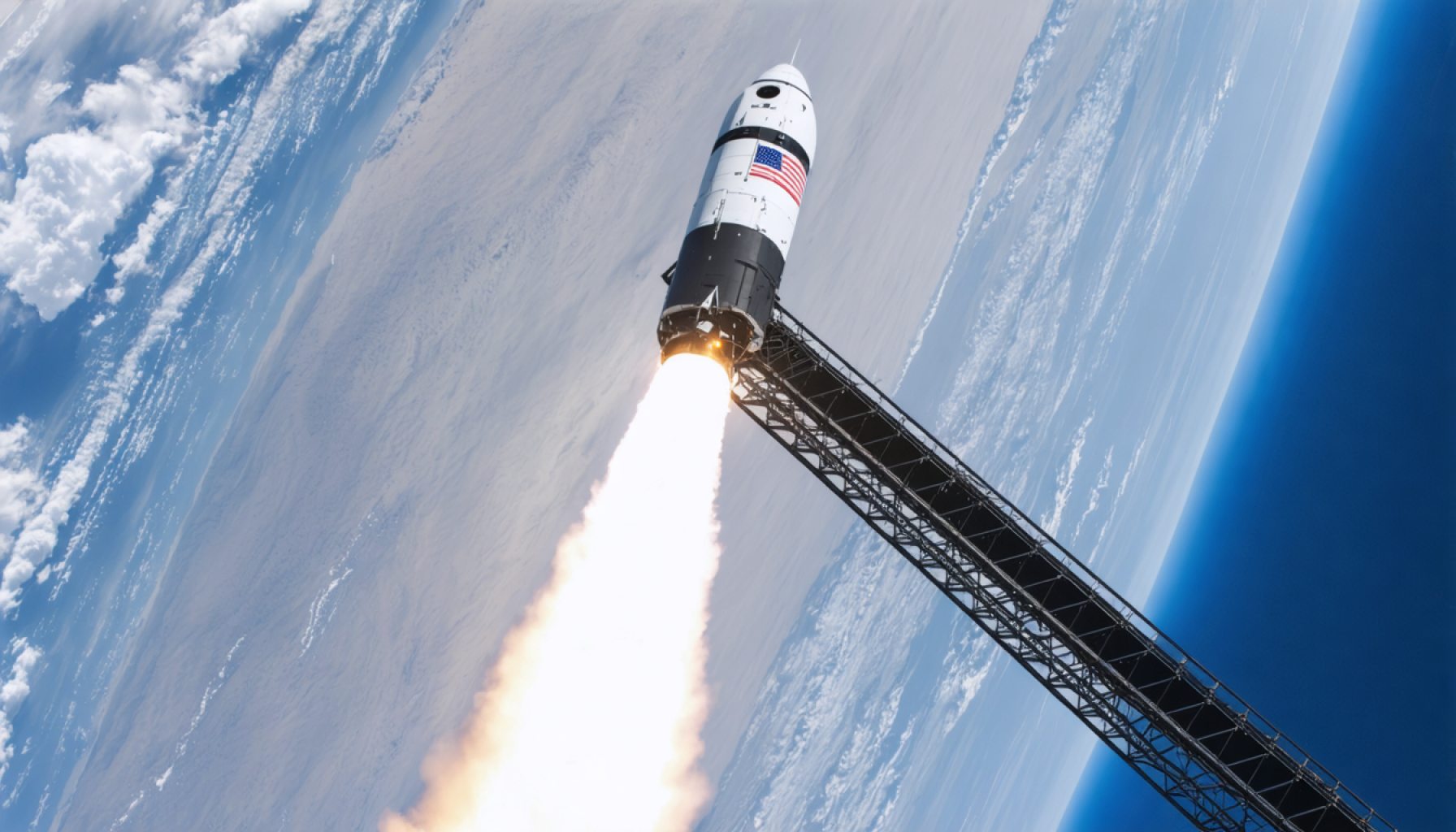- The U.S. Space Force has selected Stoke Space and Rocket Lab USA as national security launch providers, each receiving $5 million to advance their space exploration capabilities.
- Stoke Space’s Nova rocket and Rocket Lab’s Neutron rocket are key players in Phase 3 Lane 1, a crucial initiative to bolster U.S. technological strength through at least 2029.
- Both rockets emphasize reusability, aiming to reduce waste and enhance economic efficiency in space travel.
- Rocket Lab plans to launch by late 2025, while Stoke Space’s Nova is anticipated to debut soon.
- Successful rocket launches could secure large-scale orders from the U.S. Space Force, crucial for maintaining U.S. space dominance.
- Reliable and innovative technology is essential to meet the U.S. Space Force’s stringent standards.
- The initiative highlights the importance of advanced aerospace technology in future human space exploration.
In a bold leap toward redefining space travel, two dynamic companies have etched their names into the annals of U.S. military history. The U.S. Space Force has ushered Stoke Space and Rocket Lab USA into the elite cadre of national security launch providers, unveiling a $5 million endorsement for each to explore their capacity for the forthcoming era of space exploration.
In a vivid illustration, the potential of Stoke Space’s Nova rocket comes to life, cutting through the imagined expanses of the cosmos. This Kent, Washington enterprise, alongside Rocket Lab’s California team, will stand shoulder-to-shoulder with titans like Blue Origin, SpaceX, and United Launch Alliance. All are part of the valuable Phase 3 Lane 1—a strategic initiative designed to fortify America’s technological prowess from now until mid-2029, with potential to continue into the next decade.
Stoke Space presents the Nova, a fully reusable marvel, promising not just technological advancement but environmental stewardship in space exploration. Rocket Lab, not to be outdone, is advancing its Neutron rocket, a launch vehicle anticipated to redefine payload delivery. Both space-faring crafts, poised on the brink of their maiden voyages, are set to shift the paradigm of space travel.
Rocket Lab, with its well-crafted trajectory, aims for the launch pad by late 2025, while the Stoke Nova could pierce the sky imminently. The promise of reusable rockets echoes a new economic model, minimizing waste and maximizing the return on investment—a key factor in their appeal to military strategists safeguarding national interests.
The stakes are high. Successful launches will unlock doors to the vast skies, allowing these companies to vie for expansive launch orders. These orders are more than contracts; they are votes of confidence from the Space Force, affirming the technology that keeps a nation one step ahead in the race for space dominance.
As Lt. Col. Douglas Downs of the Space Systems Command underscores the potential, it’s clear that crossing the threshold of a first successful flight means entering a new league. The implication is profound: reliability and innovation in meeting the U.S. Space Force’s formidable standards.
Stoke Space asserts this nod as a recognition of its engineering prowess, poised to meet the U.S. Space Force’s stringent requirements. As the countdown begins, these two companies incarnate the future of space travel—one where the limits of the sky are no longer the boundaries of mankind’s dreams.
The path forward is illuminated not only by ambition but by the practical necessity of enhanced aerospace technology. This endeavor ensures that the future of human exploration is poised for lift-off, ready to transcend the known, and venture into the vast cosmic sea.
The Future of Space Travel: How Stoke Space and Rocket Lab Are Pioneering New Frontiers
Redefining Space Travel with Reusable Rocket Technology
The recent inclusion of Stoke Space and Rocket Lab as national security launch providers by the U.S. Space Force marks a significant milestone in the evolution of space travel. As stakeholders in Phase 3 Lane 1 of the mission, both companies aim to revolutionize aerospace technology by focusing on reusability and environmental sustainability.
Understanding the Nova and Neutron Rockets
– Stoke Space’s Nova Rocket: This fully reusable rocket exemplifies cutting-edge design with a focus on minimizing environmental impact. By significantly reducing the costs associated with launching, the Nova presents a compelling economic proposition for both commercial and defense sectors.
– Rocket Lab’s Neutron Rocket: Positioned to become a game-changer in payload delivery, the Neutron is designed for versatility, enabling a wide array of missions ranging from satellite deployments to crewed missions.
How-To Steps & Life Hacks for Aspiring Aerospace Engineers
1. Focus on Reusability: With the trend toward sustainable launches, future engineers should prioritize designs that enable rapid turnaround and cost efficiency.
2. Enhance Interdisciplinary Skills: A successful career in aerospace demands proficiency in engineering, physics, and environmental science to innovate in advanced aerospace systems.
3. Stay Informed on Industry Trends: Regularly follow industry news and publications to anticipate future technological demands and skill requirements.
Industry Trends and Market Forecasts
– Increased Focus on Sustainability: Companies like Stoke Space emphasize minimizing environmental impacts, which aligns with global trends toward greener technology.
– Demand for Cost-Effective Solutions: As the aerospace industry expands, there is a growing emphasis on reducing the costs of space missions, potentially leading to more accessible space travel.
Comparing Key Players: Strengths and Limitations
– Rocket Lab vs. Blue Origin and SpaceX: While Rocket Lab focuses on optimizing payload delivery through innovative designs like the Neutron, SpaceX and Blue Origin concentrate on massive payload capacities and deep space missions. Each company’s approach offers unique benefits and challenges in terms of cost, mission complexity, and turnaround times.
Pressing Questions and Expert Insights
What makes reusable rockets a significant advancement?
Reusability drastically reduces the cost of each launch, making space more accessible for various industries. It also leads to less waste and more sustainable practices, aligning with global environmental goals.
What hurdles do new space companies face?
The primary challenges include meeting the stringent safety and reliability standards set by entities like the U.S. Space Force and ensuring consistent performance in complex missions.
Actionable Recommendations
– Join Industry Conferences: Engaging with professionals through events like the International Astronautical Congress can provide insights into the latest developments and networking opportunities.
– Invest in Emerging Technologies: Look toward advancing technologies such as 3D printing for rocket components and AI for mission planning as essential skills for future engineers.
For more in-depth information about emerging space technologies, visit SpaceX or Blue Origin.
By embracing these innovations and developments, Stoke Space and Rocket Lab are set not just to partake in the next era of space exploration but to lead it, ensuring that space travel is more sustainable, cost-effective, and attainable than ever before.







